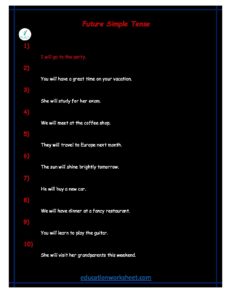how to converting Future Simple Tense interrogative sentences to negative form
how to converting Future Simple Tense interrogative sentences to negative form

The Future Simple Tense, also known as the Simple Future Tense, is a crucial aspect of English grammar that helps us express actions that will happen in the future. In this guide, we will explore the process of converting Future Simple Tense interrogative sentences into negative sentences. Understanding how to do this is essential for effective communication and writing in English.
I. Understanding Future Simple Tense

Before delving into the conversion process, let’s review what the Future Simple Tense is and how it is structured. The Future Simple Tense is used to describe actions or events that will occur at some point in the future. It is formed using the auxiliary verb “will” (or “shall” in formal English) followed by the base form of the main verb. For example:
- She will visit her grandmother tomorrow.
In this sentence, “will visit” is in the Future Simple Tense, indicating a future action.
II. Forming Interrogative Sentences in Future Simple Tense

To create interrogative sentences in the Future Simple Tense, we usually switch the positions of the subject and the auxiliary verb “will.” Here’s the basic structure:
[Will/Shall] + [Subject] + [Base Form of Verb] + [Rest of the Sentence]?
For example:
- Will she visit her grandmother tomorrow?
In this interrogative sentence, “will” comes before the subject “she.”
III. Converting Interrogative Sentences to Negative Form
Now, let’s move on to the main focus of this guide: converting Future Simple Tense interrogative sentences into negative sentences. To do this, we need to incorporate the word “not” into the sentence structure. Here’s how you can convert an interrogative sentence into a negative one:
[Will/Shall] + [Subject] + [Not] + [Base Form of Verb] + [Rest of the Sentence].
Let’s take our previous example and convert it into the negative form:
- She will not visit her grandmother tomorrow.
In this negative sentence, “will not” indicates that the action will not take place.
IV. Contracted Forms
In everyday spoken English, it is common to use contracted forms to make negative Future Simple Tense sentences more concise and natural. The contracted forms of “will not” are “won’t” (for both “will not” and “shall not”). Here’s the previous example using the contracted form:
- She won’t visit her grandmother tomorrow.
Contracted forms are widely accepted in both spoken and written English, but it’s important to note that they are generally more informal. In formal writing, it’s preferable to use the full “will not” or “shall not.”
V. Practice Examples
Now that we have a solid understanding of how to convert Future Simple Tense interrogative sentences into negative sentences, let’s practice with some more examples:
- Interrogative: Will they attend the conference next week? Negative: They will not attend the conference next week. Negative (contracted form): They won’t attend the conference next week.
- Interrogative: Will you help me with my homework? Negative: You will not help me with my homework. Negative (contracted form): You won’t help me with my homework.
- Interrogative: Will he arrive on time for the meeting? Negative: He will not arrive on time for the meeting. Negative (contracted form): He won’t arrive on time for the meeting.
- Interrogative: Will it rain tomorrow? Negative: It will not rain tomorrow. Negative (contracted form): It won’t rain tomorrow.
- Interrogative: Will we have enough time to finish the project? Negative: We will not have enough time to finish the project. Negative (contracted form): We won’t have enough time to finish the project.
By working through these examples, you can gain confidence in converting Future Simple Tense interrogative sentences into negative sentences.
VI. Special Cases and Additional Considerations
While the basic rules for converting Future Simple Tense interrogative sentences to negative form are quite straightforward, there are a few special cases and additional considerations to keep in mind:
- Modal verbs: When modal verbs (e.g., can, must, should) are used in interrogative sentences with Future Simple Tense, the negative form is created by adding “not” after the modal verb and before “will” or “shall.” For example:
- Interrogative: Can she will come to the party? Negative: She cannot (can’t) will come to the party.
- Emphasizing negation: To emphasize the negative aspect of a sentence, you can use “not” before “will” or “shall.” For instance:
- Interrogative: Will he participate in the project? Negative (emphasized): He will not, I repeat, will not participate in the project.
- Question tags: When using question tags with negative Future Simple Tense sentences, you can use “will you not” or “won’t you” to create the tag. For example:
- Negative: They will not attend the conference, will they not?
- Negative (contracted form): They won’t attend the conference, won’t they?
VII. Practice Makes Perfect
To master the art of converting Future Simple Tense interrogative sentences into negative sentences, practice is key. Try creating your own sentences and converting them to negative form. Additionally, engage in conversations and write paragraphs or essays using the Future Simple Tense in both interrogative and negative forms.
how to converting Future Simple Tense interrogative sentences to negative form


